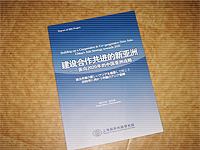Politics and Security Field
Cultivating Talented Individuals:Support Scheme:Investigative Research Assistance (for student)
CHEUNG Mong / Investigation Area: Shanghai, China
2009.02.17
Destination (Name of city and country)
Research objectives
Based on my research topic "Political Survival and the Yasukuni Controversies in Sino-Japanese Relations", my research trip in Shanghai between Feb 17 and Feb 20 consisted of two objectives: 1) To meet with Professor Jinan Wu, expert in Sino-Japanese relations and Japanese domestic politics; and 2) To meet with Professor Shuguang Zhang, expert in Cold War history in Shanghai International Studies University. It is expected that Professor Jinan Wu would provide valuable insight on Sino-Japanese interaction in the 1980s over the Yasukuni issue, especially from the viewpoint of Chinese side. It is also expected that Prof. Shuguang Zhang would offer valuable advice over the methodology on studying the Cold history between China and Japan.
Research project
This research project is about the Japan's responses towards Chinese pressure over the Yasukuni issue between 1985 and 2007. It is generally taken for granted that Japan's responses to China's demand over the issue of prime ministerial visit of Yasukuni Shrine is determined by unique factors in the bilateral relations, such as Japan's attitude to past war history, the emergence of Japanese conservative nationalism and Japan's changing image of China. This thesis challenges these interpretations and emphasizes that the issue should be understood in the rational-choice tradition of political science. In this thesis, the author seeks to investigate when Japan is most likely to be able to comply with China's demand over the Yasukuni issue. By conducting two comparative case studies from 1985 to 2007, this research argues that the domestic political legitimacy of the prime ministers or the ruling party is a vital factor that determines Japan's responses towards Chinese pressure over the Yasukuni issue. The lower the domestic cost of international cooperation for prime minister or the party, the most likely the cooperation is. This study also intends to argue that ideational and structural factors, such as the change of foreign strategy, image and nationalism, are not major factors that influence Japan responses to China's demand.
Achievement
On 18 February, I met with Professor Jinan Wu of Shanghai Institute of International Studies to discuss Chinese perspective of the Yasukuni issue in the 1980s for almost four hours. In addition to a lengthy interview with Professor Wu related to Yasukuni, he expressed his view of Japan's China policy in the past three decades. Professor Wu also generously provided me with his book and several materials to supplement my research over China's grand view of Japan and East Asia. These primary data are useful to the empirical studies and background introductory chapter of my research project.
On 19 February, due to schedule problem (an unexpected trip to US), Prof Shuguang Zhang of Shanghai International Studies University was not able to meet me. However, I was able to meet with Professor Hongyuan Yu of Shanghai Institute of International Studies, expert on Chinese foreign policy and energy study, and I attended a special conference on international relations on cooperation over energy issues. Professor Yu seeks my opinion over the issue and I offered Japanese perspective on the energy issue between China and Japan. I was able to engage in in-depth exchanges with young experts in the field of energy studies in China including Prof. Yushan Wu (Fudan University), Dr. Zhiqing Li (Tsinghua University) and Prof. Duanyong Wang (Shanghai International Studies University).
Lastly, as part of this short research trip I was able to collect latest books and materials in mainland China on Sino-Japanese relations and Japanese foreign relations.

